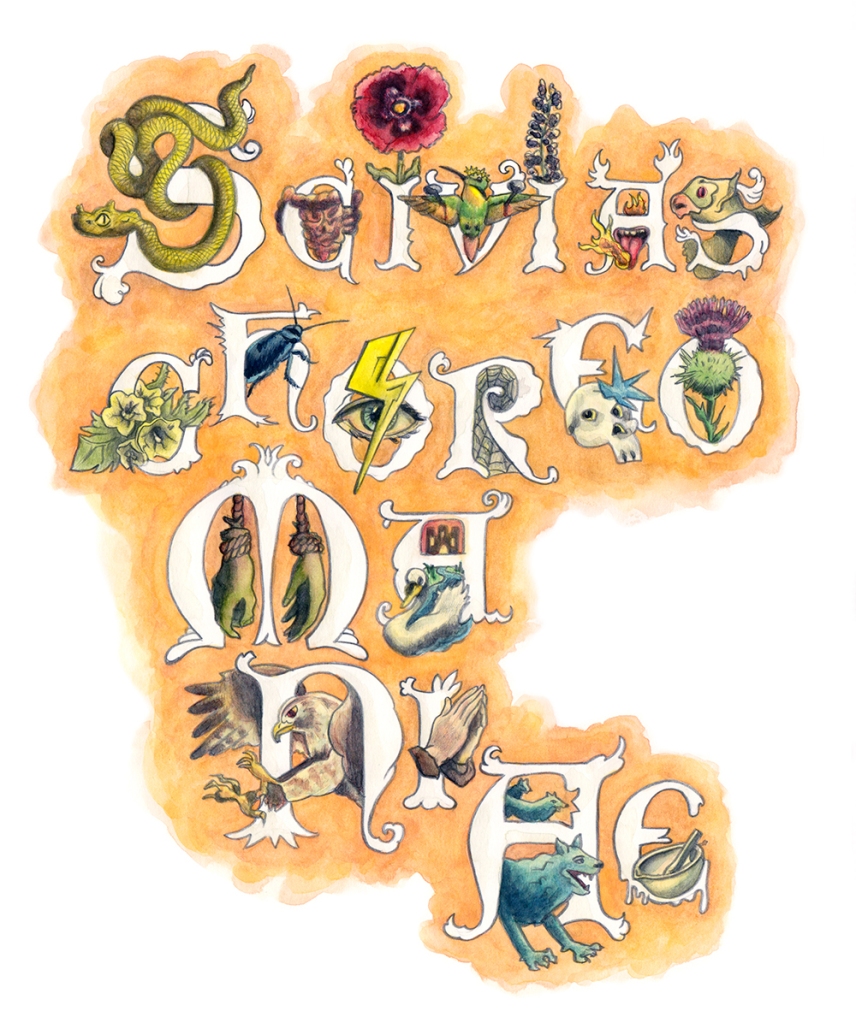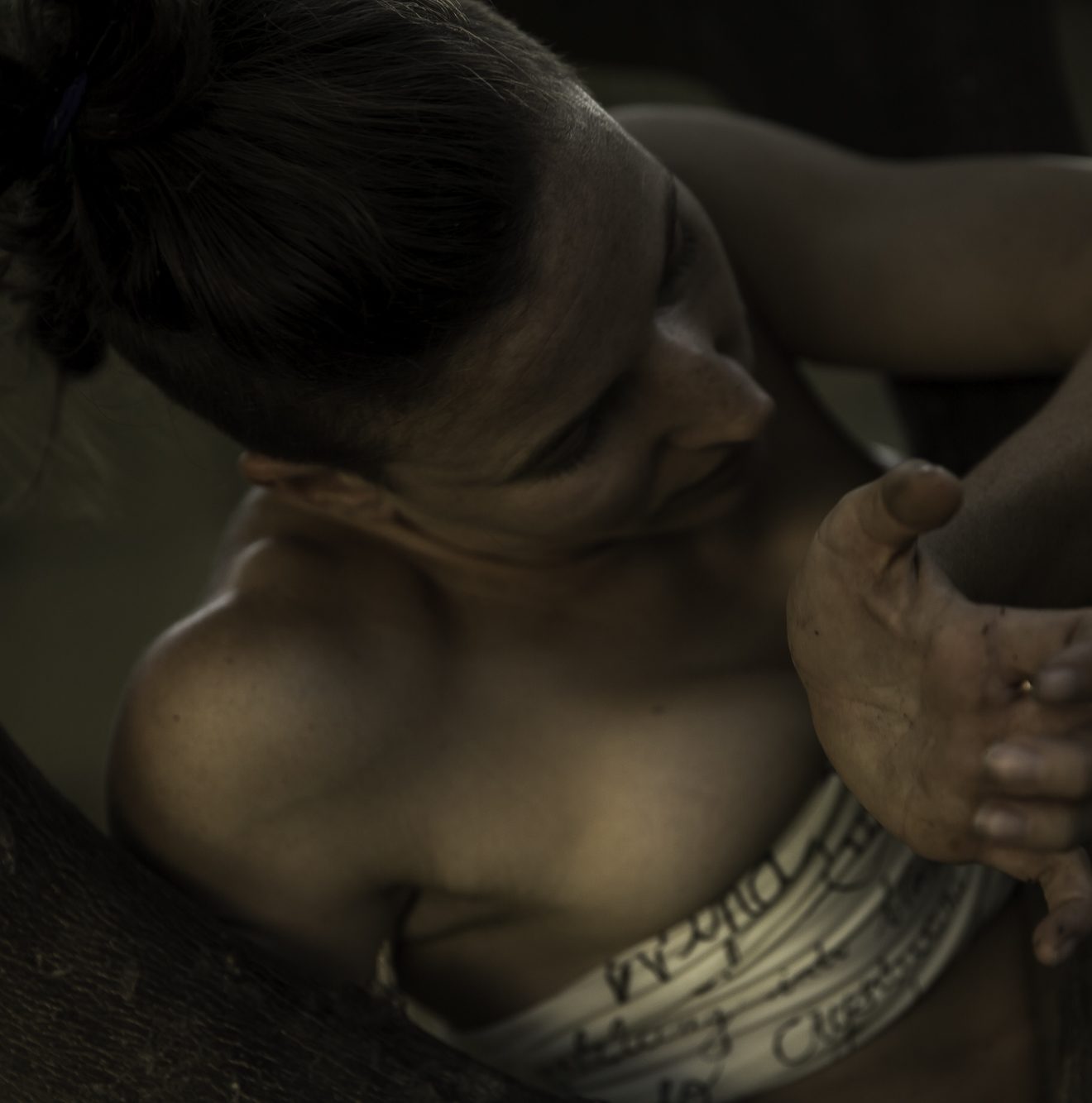
My Room
I am handed a key and commanded to walk
to the edge, where the asylum invades the field
of winter wheat. I find my office in an abandoned
cottage littered with past patients’ last words:
the burst belly of a drum bleeding in the bathtub,
a rusted knife splitting the lip of the kitchen sink,
composition books recording blank yellowed pages,
a bird’s clean skeleton bleaching on the sill.
Bare and dusty from preparing dance therapy,
my feet graze the surface of the forgotten cemetery.
Underneath the main grounds the morgue is numb
with preserved tongues and orbitoclasts for lobotomy.
Underneath my desk where I doze with the snake
who nests in my brain rest the bones of the hospital’s
unnamed dead. It is disrespectful to sleep over the stones
of the insane without dreaming our dreams.
Stomach, God, Glove, and Fruit
R delivers another urgent message:
The clowns want you to go home-y. Home-y is a place for the clowns.
The wolves want you to go home; home is a place that is real; the wolves
are in God, and the wolves come from God.
When we are alone, he confides:
When we dance with both feet on the ground, we can read the wind
we would sense through thick fur were we allowed outside.
He is another visionary in whom no one stakes faith. Together we are
wolves. We move our paws to feel the breeze and learn from its songs
the ways to move. Sometimes, his words transform to salad
the doctors want to discard as rotten, but the leaves
are nourishing to us. He trusts he can reveal, I see between
the lines between the lines between the lines,
and I am telling you.
I tell him, I also believe in this between-between; in between
is where I become.
He nods, Oh, yes, I saw you dancing there.
We recognize ourselves, and he makes a painting of my movements
he calls Stomach, God, Glove, and Fruit.
In the floating stomach glows a fruit. The fruit grows its own tree
from the inside out. God reaches in and twists that tree with a glove.
I too find it painful. I don’t want the God-gloved hand to grip
my growing tree and twist it again in His violent fist.
To combat this, we decide upon open palms.
Open the palm and the eye opens.
This is the way of the wolves.
Kind Darkness
We do not have enough words for darkness, the mutations. In time
the kinds will equal the ocean. We can no longer endure the confines
of an embrace. A chalice shines darkly with my venomous blood.
My keepers comb the garden for the poisons I wept, clutching
my revenants to my chest. They bind the body to coax the demons out.
All are sad for them who devolve within the womb, smothered
by the right hand. We perform our divinations by means of a ritual
laughter, sew leaden vespers into the white coat pockets of our confessor
before he approaches the river to drown our madness in stones.
Otherwise, he would claim and baptize the earth. Christ is the Verb
who delivers the danger. In a devastated sky the sun is hanged, black
sackcloth of coarse hair. Horses pass afloat outside. In tenebrous garden
waves the sea where we will be cast, the dreamstone knotted around my-
our neck. Imagine, the audience—hungry doctors in alabaster jackets—
are appalled when it does not weigh us down as contrived. In kind
darknesses we lack the language to sleep. The currency of hope is still
light. The soul issues a contrafugue, and we weep into our nests by night.
Dreams drip from our bloody stitches. The phlebotomist whets his fleam,
but it is unsafe to leave. Christ appears by vision and slips the holy
foreskin in the medieval mystic’s open mouth, asks us to treasure
the host. Our confessor envies the croques-prépuces who lick their lips
when they finish testing whether the foreskin is genuine so as not to risk
crumbs lost to cloth, flesh wasted upon napkins. They cry under cover
of darkness staring at Saturn’s rings. We lie down without words
in our mouth, but how can we rest? There is a body between God and us.
✶✶✶✶

Lake Angela is a poet, translator, and dancer-choreographer who creates at the confluence of verbal language and movement. Her books of poetry include Organblooms and Words for the Dead from FutureCycle Press, and Scivias Choreomaniae is forthcoming from Spuyten Duyvil. She holds a PhD in the intersemiotic translation of Austrian Expressionist poetry into dance and has her MFA in poetry. Lake is poetry editor for the multilingual journal Punt Volat. She is a medieval mystic, beguine, and nonhuman creature. As director of the poetry-dance group Companyia Lake Angela, she presents the value of schizophrenia spectrum creativity. She welcomes visitors and collaborators at lakeangeladance.com.